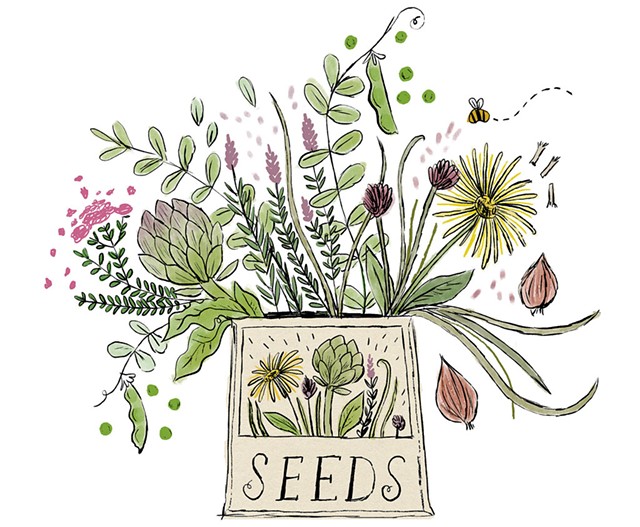
- Julianna Brazill
As they ring in a new year, many people strive to plant the seeds of good habits, hoping to reap the benefits of healthier behavior patterns. (Dry January, we see you!) Many resolutions involve exercise, getting fresh air and eating more vegetables.
One way to meet all of those goals at once is planting actual seeds. Gardening is good for both physical and mental health, and getting rosemary and tomatoes to show for your efforts sweetens the deal.
In recent years, seed companies have been sending out their catalogs earlier and selling out sooner. So, if you want to score the leek variety of your dreams, start planning now.
Online shopping gives gardeners access to seed sellers nationwide, and many are familiar with Wolcott's High Mowing Organic Seeds, but Vermont also has smaller and more specialized sellers. Read on to learn about a multigenerational company that got its start importing French snails, a two-person operation that specializes in endangered varieties, and a business that deals solely in medicinal and culinary herbs and flowers.
Growing Up Gourmet
Le Jardin du Gourmet, St. Johnsbury, artisticgardens.com
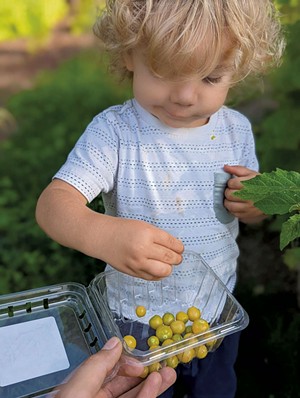
- Courtesy
- Roland Taylor harvesting ground-cherries
Shallots were practically unknown in the United States until they made their way into American cuisine thanks to the "Shallot King." In 1954, Raymond Saufroy, a French coal miner turned New York City chef, was dismayed that he couldn't find shallots, couscous or escargots to use at his restaurant. So he began importing them from his native country.
During the '60s, Saufroy left the restaurant biz and bought a farm in New Jersey. He started growing shallots, added European herb and vegetable seeds to his offerings, and renamed the business Le Jardin du Gourmet. Then, in the mid-'70s, he moved the operation to West Danville.
The key to Saufroy's enterprise was offering small, inexpensive packets so that home gardeners could harvest a wide variety of crops without shelling out for seeds they didn't need. The tiny West Danville post office was soon inundated with envelopes, each containing a single dollar and a request for Saufroy's most popular offering: an eight-variety sampler pack, a catalog and a booklet of recipes.
In 1988, Saufroy sold the business to his daughter and son-in-law, Suzanne and Paul Taylor, who moved it to St. Johnsbury. They are now preparing to sell it to their son, Mathew Taylor, 34, and his wife, Alejandra.
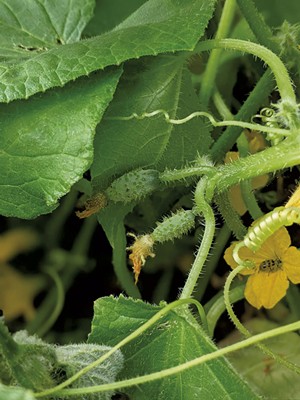
- Courtesy
- Baby cucumbers at Le Jardin du Gourmet
Many of Le Jardin's seeds are still imported from Europe, although the Taylors also buy from American seed companies. Their packets — some filled by Mat using tiny spoons, others by machine — come in just two sizes and price points: 45 cents or $1.25. A "50-vegetable seed packet special" combines some of their most popular varieties for $24.50.
The company's focus on fine cuisine shows in its selection, which includes common crops, such as tomatoes, cucumbers and lettuce, alongside salad burnet, black mint, epazote, tiny fraise des bois strawberries, saltwort and multiple kinds of mâche. And, of course, Le Jardin also sells shallots.
In the Taylors' shop, seeds are stored in hundreds of red plastic Folgers coffee containers before going into packets. "We used to put them in glass containers," Paul said, "but in the '80s there was an earthquake, and everything came off the shelves. That's how 'mixed radishes' came about."
The company's mailing list, which the Taylors maintain with the same software they have used since the 1990s, includes 168,000 names. Once he has taken over day-to-day operations, Mat hopes to expand the business to include a garden center with greenhouses and a shop. He'd like to educate his customers on how to pursue self-sufficiency by setting up their own year-round greenhouses, he said.
Saving Salsify
Solstice Seeds, Hartland, solsticeseeds.org
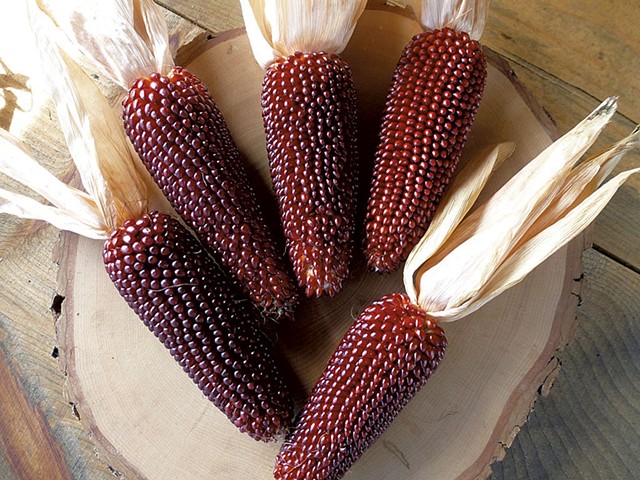
- Courtesy
- Vermont Red Kernel corn from Solstice Seeds
The Solstice Seeds catalog, which is available only online or as a pdf, describes plant varieties exuberantly. Some blurbs include detailed origin stories. Others offer recipes. Some have both. Houshu cabbage is described as "a favorite introduced by the Japanese agriculture students at Rudolf Steiner College." The catalog recommends trying it "finely sliced as a salad with grapefruit, toasted nuts or seeds and a rice vinaigrette."
These friendly notes come from founder Sylvia Davatz, a Swiss-born Hartland resident much sought after for her seed-saving knowledge. While she has mostly retired from Solstice, her neighbor and collaborator, Brian Stroffolino, 36, has taken the reins.
According to Stroffolino, Solstice has a mission different from that of many other seed companies: to safeguard rare varieties, such as Lüthy salsify, golden midget watermelon and orange giant amaranth, by "growing them out" and providing the seeds to other gardeners. "The seeds dictate the catalog," he explained. "Instead of growing [what's] popular, it's based on preservation."
Stroffolino grows nearly all of the Solstice seeds himself, with help from Davatz, despite having a full-time job as Hartland's town clerk and a side hustle managing the local farmers market.
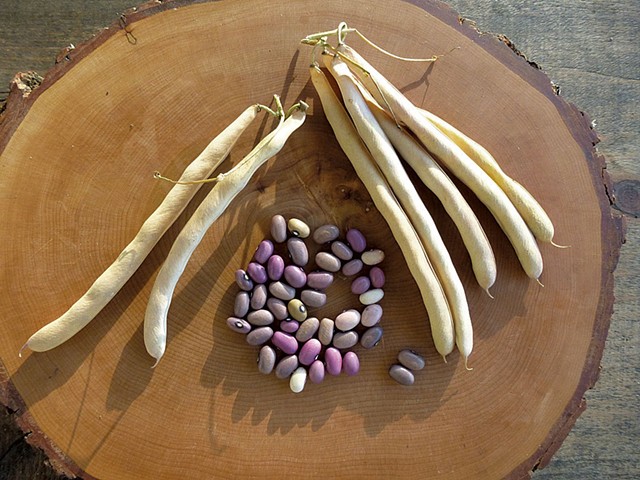
- Courtesy
- Ugandan Bantu beans from Solstice Seeds
As the climate changes, Stroffolino said, some plants adapt more successfully than others. Certain crops do better in warmer conditions, others in cooler ones; some will eventually thrive in dry areas, others in damp. The more varieties people grow, the more likely it is that some will prosper as the weather becomes more extreme.
"It's the big reason that we should be diversifying and looking into native perennial crops," he said.
Busy finishing the 2023 catalog, Stroffolino said regular customers will notice a smaller selection than in the past. He has let go of some items that are easy to find through other growers, including black turtle beans and rattlesnake beans, and focused on rarer items. "It takes the pressure off," he explained, "because it reduces the huge number of varieties we've been maintaining."
In a perfect world, Stroffolino said, enough people would be growing the varieties that Solstice curates and saving their own seeds to safeguard the plants against obsolescence. Until then, he and Davatz will keep plugging away.
Keeping the Beat
Earthbeat Seeds, Worcester, earthbeatseeds.com
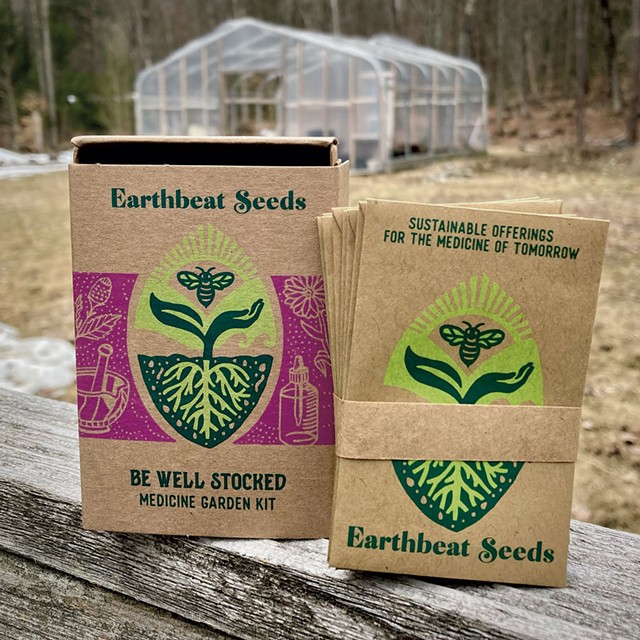
- Courtesy
- Earthbeat seed packets
In 2010, Rutland-raised Jessica Manchester was living what she described as "the typical American dream" in Buffalo, N.Y. "I had a house and a partner and a career as a teacher," she said, "but I was deeply unhappy."
At the time, the highlight of Manchester's week was picking up her CSA share at Thorpe's Organic Family Farm in East Aurora, N.Y., an hour's drive from her home. Her delight in those farm visits spurred her to leave the life she'd created and return to Vermont.
Back in the Green Mountains, Manchester took any job she could think of that got her close to the land — she catered, made cheese, "worked for a lot of farms" and studied plant medicine at Plainfield's Vermont Center for Integrative Herbalism.
One day, she recalled, it "popped into my head that I should be 'farming seeds.'" To learn more about the biz, she took a job at High Mowing Organic Seeds. On her first day, after some training, she was handed a stack of orders to fulfill. The very first one was destined for the New York farm where she used to pick up her CSA.
"It gave me a solid feeling that I was on the right path," she remembered thinking.
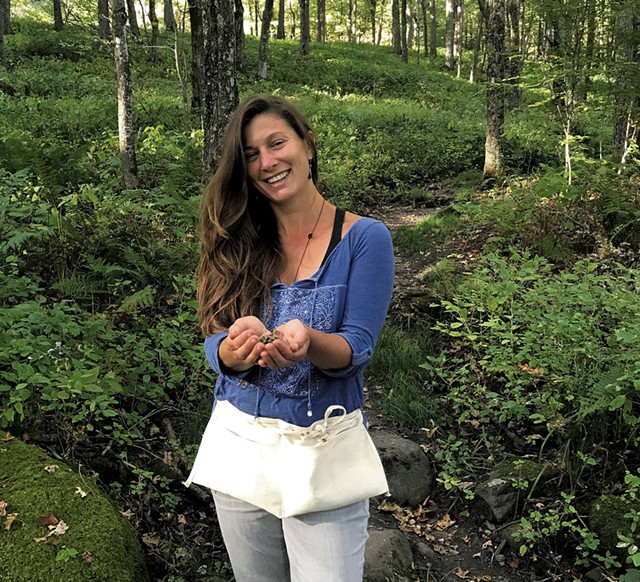
- Courtesy
- Jessica Manchester of Earthbeat Seeds
Now 43, Manchester founded Earthbeat Seeds in 2017 as a hobby, packaging and selling online 24 varieties of medicinal and culinary herb seeds that she'd grown, wild harvested or gleaned from other people's land. The heartening response from customers encouraged her to continue, despite not having her own farm.
Lacking acreage, Manchester turned to collaborations. To source the seeds she didn't have room to grow, she teamed up with her friend Erin O'Hara of Turtle Hill Native Plants in Montpelier, as well as a handful of growers on the West Coast.
On her simple website, Manchester posts photos of the colorful medicinal flowers and culinary herbs she sells and lists the provenance of each variety. She supplies the chamomile, common milkweed, wild leeks and wormwood, while California poppies, white sage and hyssop come from afar.
Because the plethora of seed options can overwhelm new gardeners, Manchester offers three starter kits in addition to individual packets: one for growing medicinal plants, one for herbal teas and one for culinary herbs.
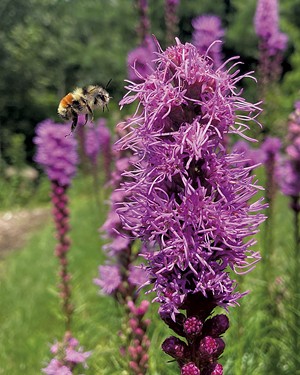
- Courtesy
- Attracting pollinators at Earthbeat seeds
Last year, after losing her primary job due to the pandemic, Manchester decided to make Earthbeat her full-time gig. For extra income, she chose to supplement her direct sales by taking on 30 to 35 wholesale accounts per year, primarily garden centers and food co-ops around New England.
Not long after putting up her first display — at Montpelier's Hunger Mountain Co-op — Manchester stopped in to get groceries and noticed some kids and their mother excitedly examining her wares. That kind of community engagement keeps her motivated, she said.
Eventually, Manchester plans to buy a farm. Until then, she continues to build the soil on her half-acre plot in Worcester — glacial till full of rocks and roots. After five years of attention, she said, it's gone from being desolate to hosting dense flower beds, worms, robins and flocks of migratory birds that have added a new stop to their route.
"What I'm doing really cultivates appreciation of the long game," Manchester said. "When you nurture something for a long time and you finally get a harvest, it's sort of glorious."
Remember that when you don't feel like going to the gym.








Comments
Comments are closed.
From 2014-2020, Seven Days allowed readers to comment on all stories posted on our website. While we've appreciated the suggestions and insights, right now Seven Days is prioritizing our core mission — producing high-quality, responsible local journalism — over moderating online debates between readers.
To criticize, correct or praise our reporting, please send us a letter to the editor or send us a tip. We’ll check it out and report the results.
Online comments may return when we have better tech tools for managing them. Thanks for reading.